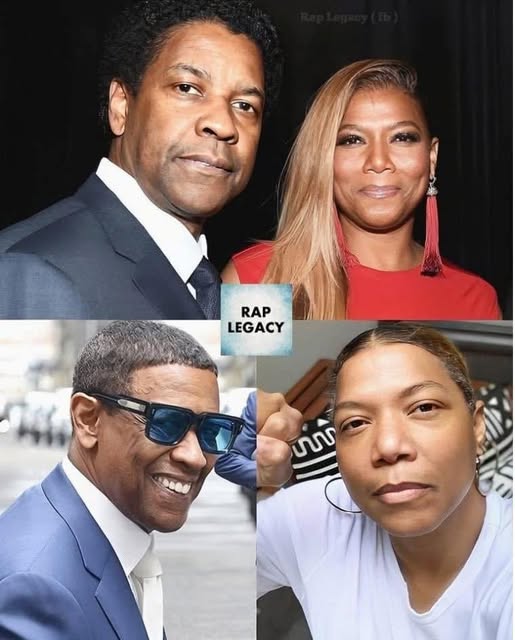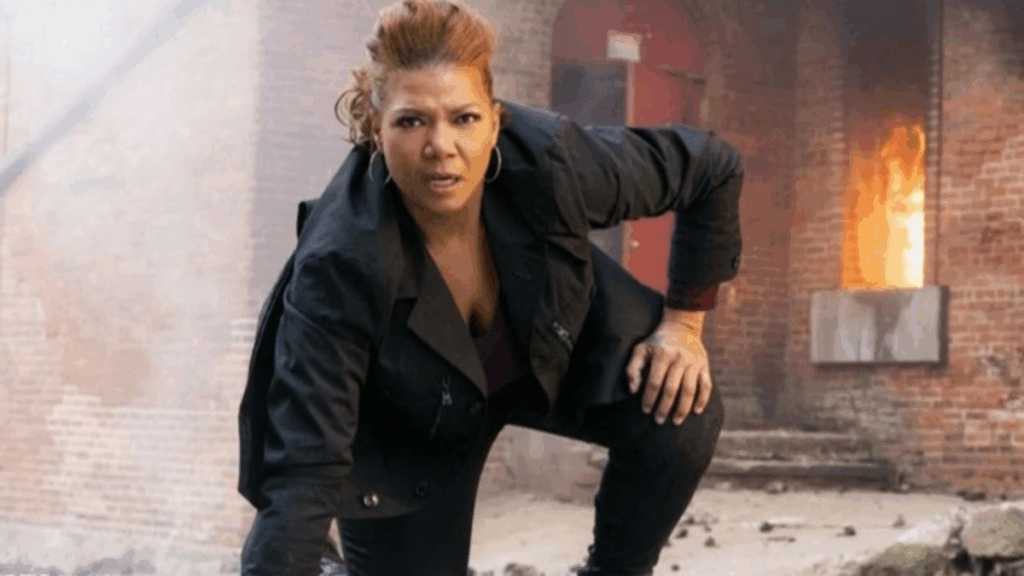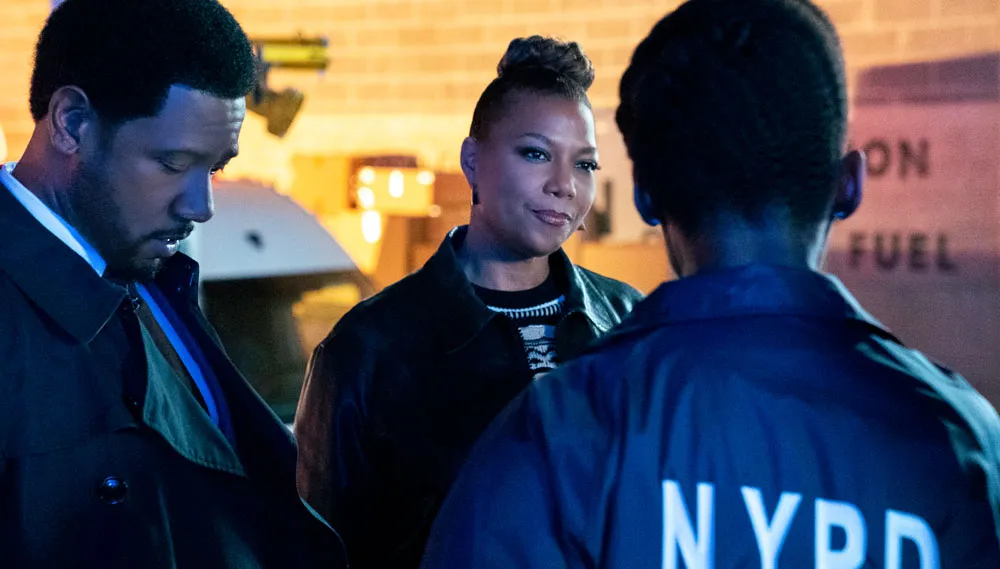Queen Latifah Redefines the Action Hero in The Equalizer: Breaking Barriers and Making History

In 2014, Queen Latifah, the multifaceted rapper, singer, and actress, shared a playful sparring moment with Denzel Washington on her talk show, The Queen Latifah Show. The lighthearted exchange was a fleeting moment of camaraderie, with no hint that it foreshadowed a groundbreaking shift in Hollywood. Seven years later, in 2021, Latifah stepped into Washington’s iconic role as Robyn McCall in the CBS reboot of The Equalizer, a franchise that began as a 1980s TV series and was later cemented in pop culture by Washington’s intense, brooding performances in the film trilogy (2014–2018). What seemed like an unlikely transition became a cultural milestone: Queen Latifah not only took on the mantle of a legendary action hero but also redefined what it means to be a Black female lead in a genre long dominated by men. Through her commanding presence, emotional depth, and trailblazing approach, Latifah shattered stereotypes, reshaped the action hero archetype, and made television history.
This article explores how Queen Latifah’s portrayal of Robyn McCall in The Equalizer challenged Hollywood norms, brought fresh representation to primetime television, and redefined the action genre for a new era. From her seamless blend of physicality and vulnerability to her impact on diversity in media, Latifah’s journey in The Equalizer is a testament to her versatility and a beacon for change in an industry ready for transformation.
From Talk Show to Action Hero: An Unexpected Journey
Queen Latifah, born Dana Elaine Owens, has long been a force in entertainment. Rising to fame in the late 1980s as a rapper with hits like “U.N.I.T.Y.” and “Ladies First,” she championed empowerment and self-respect, particularly for Black women. Her transition to acting in films like Set It Off (1996) and Chicago (2002)—which earned her an Academy Award nomination—showcased her range, from gritty drama to musical brilliance. By 2014, as host of The Queen Latifah Show, she was a beloved figure, engaging audiences with her warmth and charisma. Her playful on-air sparring with Denzel Washington, a titan of the action genre, was a moment of levity, but it planted a seed for what was to come.

When CBS announced in 2020 that Latifah would star in and executive produce a rebooted The Equalizer, the news sparked intrigue and skepticism. The original series (1985–1989) starred Edward Woodward as Robert McCall, a former intelligence operative turned vigilante, while Washington’s film trilogy reimagined the character as a stoic, lethal enforcer. Both iterations were male-driven, with a focus on gritty, methodical justice. Could Latifah, known for her musical and dramatic roles, step into such a physically demanding and culturally significant part? The answer, as viewers soon discovered, was a resounding yes.
Reimagining Robyn McCall: A New Kind of Action Hero

Latifah’s Robyn McCall is a single mother, former CIA operative, and vigilante who uses her skills to help those with nowhere else to turn. Unlike Washington’s McCall, who was defined by his stoic intensity, Latifah’s version brings a layered complexity that blends fierce combat prowess with emotional vulnerability. Her Robyn is not just a fighter but a nurturer, balancing her mission to deliver justice with her responsibilities as a mother to her teenage daughter, Delilah. This duality sets her apart in a genre where action heroes are often portrayed as emotionally distant or singularly focused on their missions.
Physicality and Authenticity
One of the most striking aspects of Latifah’s performance is her physicality. At 50 years old when the series premiered, she defied ageist and gendered expectations by performing many of her own stunts. From hand-to-hand combat to high-stakes chases, Latifah trained rigorously to embody Robyn’s strength and precision. Her fight scenes are not just choreographed spectacle; they carry an authenticity that reflects her character’s military background and street-smart instincts. In an industry where Black women are rarely cast as action leads, Latifah’s ability to command these scenes with confidence and grace is revolutionary.
Emotional Depth
Beyond the action, Latifah infuses Robyn McCall with a profound emotional core. Her character grapples with the moral weight of her past as a CIA operative and the challenges of raising a daughter in a world fraught with injustice. Scenes between Robyn and Delilah, played by Laya DeLeon Hayes, are among the show’s most compelling, highlighting Latifah’s ability to convey warmth, regret, and resilience. This emotional accessibility makes Robyn relatable, allowing viewers to see her not as an untouchable hero but as a woman navigating complex personal and professional demands.
Charisma and Cultural Resonance

Latifah’s natural charisma is a cornerstone of her performance. Her ability to connect with audiences—honed through decades as a performer—translates seamlessly to Robyn McCall. Whether she’s delivering a witty one-liner or staring down a villain, Latifah brings an undeniable presence that makes her both commanding and approachable. For Black audiences, particularly Black women, her portrayal resonates deeply, offering a rare depiction of a Black female hero who is unapologetically powerful yet profoundly human.
Shattering Hollywood Norms: Representation and Impact
Queen Latifah’s casting as Robyn McCall is a landmark moment for representation in Hollywood. The action genre has historically been dominated by white male leads, with characters like James Bond, John Wick, and Jason Bourne setting the standard. Female action heroes, while increasingly visible through figures like Charlize Theron in Atomic Blonde or Scarlett Johansson in Black Widow, remain underrepresented, and Black women have been almost entirely absent from these roles. Latifah’s Equalizer changes that narrative, placing a Black woman at the center of a primetime action series—a rarity in television history.
Breaking Gender and Racial Stereotypes
By stepping into a role originally crafted for men, Latifah challenges the gendered assumptions that action heroes must be male to be believable. Her Robyn McCall is neither a damsel in distress nor a hypersexualized caricature, two tropes that have often plagued female characters in action narratives. Instead, she is a fully realized protagonist whose strength, intelligence, and compassion drive the story. As a Black woman, Latifah also confronts racial stereotypes, proving that Black female leads can carry a high-stakes action series while appealing to a broad audience.
The significance of this representation cannot be overstated. For young Black women and girls, seeing Latifah as Robyn McCall offers a powerful role model—one who embodies resilience, agency, and heroism. In a 2021 interview with Variety, Latifah reflected on her role, saying, “I wanted to show that a Black woman could be the hero, could be tough and tender, and could carry a show like this. It’s about showing what’s possible.”
Redefining the Action Genre

Latifah’s Equalizer redefines the action genre by emphasizing inclusivity and emotional storytelling. Unlike traditional action narratives that prioritize spectacle over substance, the series weaves social issues—such as systemic racism, economic inequality, and domestic violence—into its plots, reflecting the real-world challenges its characters face. This approach aligns with Latifah’s long-standing commitment to advocacy, evident in her music and earlier roles. By grounding the action in these themes, the show broadens the genre’s appeal, attracting viewers who might not typically gravitate toward action dramas.
The series also diversifies the action genre through its supporting cast, which includes characters of varied racial, cultural, and gender identities. This inclusivity extends behind the scenes, with Latifah serving as an executive producer and advocating for diverse writers and directors to shape the show’s vision. The result is a series that feels fresh and relevant, resonating with a modern audience hungry for authentic representation.
Making History: A Cultural Milestone
The premiere of The Equalizer on February 7, 2021, following Super Bowl LV, drew 20.4 million viewers, making it one of the most-watched series debuts in recent years. The show’s success is a testament to Latifah’s star power and the appetite for diverse storytelling. Renewed for multiple seasons, The Equalizer has solidified Latifah’s place as a trailblazer, proving that a Black woman can lead a major network series